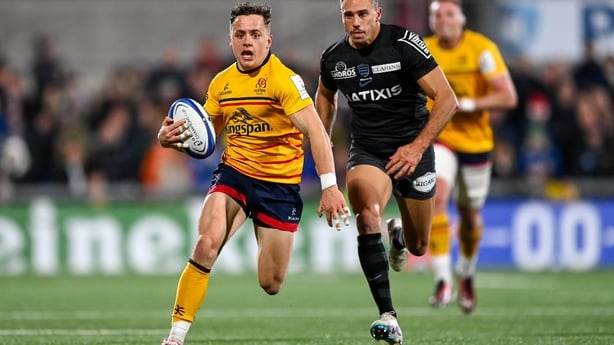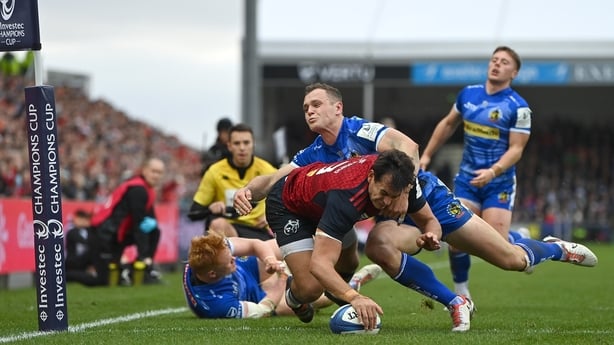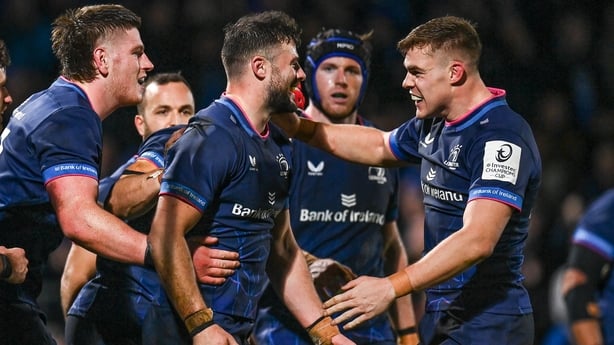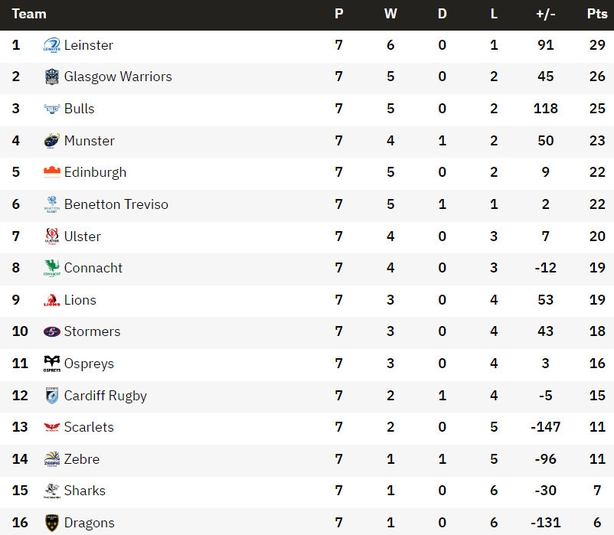Round two of the Investec Champions Cup rugby was a mixed bag for Irish provinces.
Connacht and Munster lost their respective matches to English opposition, Saracens and Exeter, leaving them in very vulnerable and winless positions with only two rounds left in the group stages.
Their destiny is out of their hands after failing to win their opening two ties.
Ulster and Leinster are in more favourable positions in their pools, with Leinster in full control after two wins.
All four teams will now buckle up for the festive period of back-to-back provincial matches.
Ulster will host Connacht first on Friday night, while Leinster will travel to Thomond Park on St Stephen's day.
With the IRFU player-management system, as well as some players returning from injury, there will be an element of rotation for these derbies, especially considering that there are two more European weekends in January.
Selection will depend on where each squad is at and how much they can afford to change things up in the next two rounds.
Although Connacht were away from home against English heavyweights Saracens, they were well beaten and there were some elements of their game that they will need to tighten up going into the showdown in Belfast on Friday night.

The three-time champions scored multiple maul tries, which is also a strength of the Ulster pack.
If Pete Wilkins and his coaches don’t focus on that area of their game before Friday, as well as reducing some of the entries that they are giving the opposition, they could be in for a long night on Friday.
Ulster confidence should have taken a step forward after their dominant display against Racing 92. Their penalty count was far superior to Racing, only conceding one penalty in the first half, which allowed them to gain access to the Racing half.
They used their maul to great effect throughout the game, even scoring off two tap-and-go penalties, from which they created a maul to get Nick Timoney over the line. They will see that area of the game as a strength against Friday’s visitors as well.
Ulster’s backs were moving well against a sub-par Racing defensive line.
The Top14 leaders were quite passive in defence, which won’t be the same defence that Connacht will utilise against Ulster.

Stuart McCloskey, James Hume and Mike Lowry, in particular, played a lot of rugby on the tackle line because Racing gave them time and space to make decisions.
However, the northern province were terrible in the lineout in the opening quarter of the game.
Rob Herring missed the target twice in the opening minutes before being replaced for a HIA assessment.
Tom Stewart followed his lead with a lost lineout and a crooked throw soon after. Herring returned after a successful HIA and Dan McFarland’s side found some rhythm in the lineout, but five missed lineouts in the opening quarter won’t cut it in any provincial match.
Connacht have a very effective defensive lineout, depending on their selection, and could target that area of the game to disrupt the hosts’ gameplan.
Munster are due a win to get their season back on track, after throwing away a dominant lead away to Exeter, following a disappointing home draw against Bayonne.
The 2006 and 2008 winners were impressively effective in the opening half against Exeter, aided by windy conditions.

Jack Crowley, Alex Nankivell and Antoine Frisch varied their game between looping passes and kick passes to beat the onrushing defence.
That type of game management will stand to them when they face Leinster next Tuesday night.
The Premiership ship dropped their full back to cover for any long kicks but maintained their line speed in a packed front line, leaving the last attacker free in a calculated gamble.
Leaving the last defender is a bit of a dare for the opposition to try to escape the midfield rush and find a way of getting the ball to the edges.
Rob Baxter’s men would back themselves to scramble to the edge and cover the last attacker if the opposition manage to get the ball there.
With accurate kick passing, Munster were able to take control of the scoreboard.
Frisch and Nankivell were able to throw the pass over the top to the wider players but also caused trouble with footwork and offloading ability if Exeter got their set up wrong.
Unfortunately for Graham Rowntree’s side, they weren’t able to deal with the Exeter kicking game in the second half either and they lost a commanding lead in a game where a victory would really set them up to qualify from the pool.

Leinster will have a lot of similarities under Jacques Nienaber’s defence.
There’s a notable difference in how they are attacking the opposition breakdown to slow their attacking ball, and then continuing to press off the defensive line each time a pass is thrown.
It resulted in numerous turnovers last weekend against a weakened but courageous Sale Sharks team that challenged the hosts for the opening half.
Jimmy O’Brien picked up a ball from his bootlaces, which was a result of the pressure that Leinster put Sale under from the inside channels out.
Passes are less accurate when the inside defenders give the half-backs less time on the ball.
Exeter wasn’t a bad practice run for Munster to get to grips with the Leinster ways. They’ll be using similar tactics to get one over on their rivals next week.
Leo Cullen’s side, however, aren’t perfect and they made a bit of a slog of the first half against Sale, who rested their frontline players in a bid to box clever in the Champions Cup this year.
The competition allows four teams from six to progress into the knockout stages and Sale decided that taking Leinster on away from home was a poor use of their resources.
In hindsight, if they had the tactical genius of George Ford, among others, they could have pushed Leinster quite close.
The visitors finished the game much stronger than Leinster, who showed that there are still areas of their system that need bedding in.

While selection will be interesting for the next two rounds, the games will have a huge bearing on the URC table, which should start to spread the teams in the top positions.
Six points separates second and ninth.
A couple of results could put any of the Irish provinces closer to the top, but poor performances leading to losses could see things starting to slip away.
With Irish selection around the corner, these rounds are crucial for a number of reasons, before heading back into Europe.


